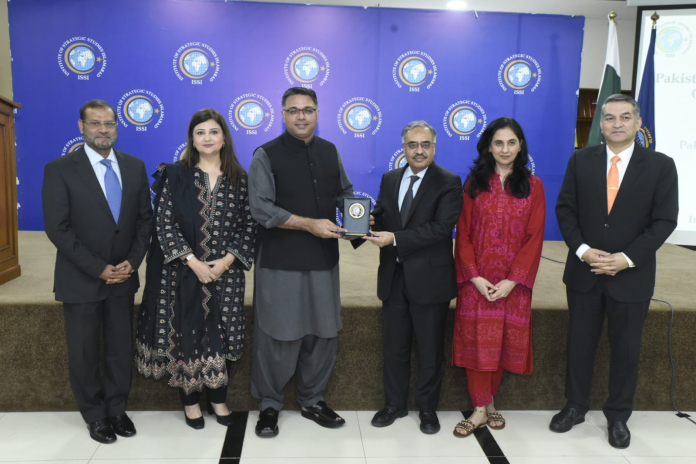ISLAMABAD, OCT 4 (DNA) : Muhammad Azfar Ahsan, former Minister for Investment, stressed the need for Pakistan to prioritize optimizing its existing investments, advocating for a strategy that focuses 80% on nurturing current investors rather than concentrating on attracting new investments.
Azfar spoke at a special talk hosted by the China Pakistan Study Centre (CPSC) at the Institute of Strategic Studies Islamabad (ISSI) on the topic of “Pakistan’s Investment Landscape: Challenges, Opportunities, and Way Forward.” He emphasized that sustainable economic growth and stability can only be achieved by consolidating resources, improving capacity-building, and creating an enabling environment for investors. “If we focus 80% on existing investments, foreign investment will follow,” he remarked.
Comparing Pakistan’s investment track record to its regional neighbors, Azfar highlighted that the country has attracted USD 49 billion in foreign investment over the last 25 years, averaging USD 2 billion annually. In comparison, smaller African nations attract USD 3 billion annually, Bangladesh secures USD 3.5 billion, and India pulls in USD 50 billion every year. “This disparity reflects the need for a coherent national strategy and reforms to improve Pakistan’s competitiveness,” he said.
Azfar also raised concerns about Pakistan’s rapidly growing population, which is expected to reach 400 million by 2047. “Pakistan is the fifth most populous country today with 250 million people, and without a strategy to address education, health, and population growth, the country’s prospects will remain bleak,” he warned.
Highlighting the need for policy continuity and long-term planning, Azfar mentioned India’s IT sector, which generates USD 200 billion annually. He emphasized that a strong education system, consistent policies, and strategic government initiatives are key to replicating such success in Pakistan.
To address these challenges, he proposed the creation of a ‘Charter of Business’, a comprehensive economic strategy approved by the Parliament and the National Security Council, ensuring continuity across different government tenures. “We need policies that are not affected by changing governments,” he asserted.
Drawing comparisons with other successful countries, Azfar Ahsan praised the robust investment environments provided by Saudi Arabia and Uzbekistan, urging Pakistan to adopt similar models. He also encouraged closer collaboration with China, particularly in technology exchange, noting that Pakistan’s youthful population complements China’s aging demographic. He further called for capacity-building in Pakistan’s public and private sectors, stressing the importance of reforms within ministries to create a more favorable climate for local and foreign investors. “If the environment for local investment improves, foreign investment will follow naturally,” he said.
Azfar also criticized the lack of long-term planning, frequent leadership changes, and the political instability that has hindered the country’s progress. He urged a national-level dialogue to bridge political divisions and promote unity behind a shared national vision. He also underscored the need to engage Pakistan’s diaspora, which, if provided the right environment, could significantly boost the country’s economy. He pointed to the Roshan Digital Account as an example of an initiative that could succeed if executed seriously. “Pakistan’s foreign reserves stand at USD 8.8 billion today, and tapping into the diaspora’s potential could transform the investment landscape,” he added.
On political stability, he underscored the need for national dialogue and stakeholders’ engagement. He warned that political polarization is the biggest challenge facing the country today and called for collective efforts to unify the nation’s interests. “Muhammad Bin Salman has worked with six different prime ministers of Pakistan – this political instability must end,” he remarked.
Lamenting the absence of a national-level strategy in key sectors such as health, education, media, tourism, food security, technology, and finance, he said: “Pakistan is facing an identity crisis. Are we a democracy, a kingdom, a dictatorship, or a presidential government? There is no unified vision,” he observed.
Azfar urged the country to learn from countries like Vietnam, Middle Eastern nations, and Africa, where continuity of policies has been key to their success. “Special Investment Facilitation Council (SIFC) is a good concept, but it is not sustainable. The Board of Investment (BOI) should not be ignored,” he cautioned, advocating for a 25-year national strategy to guide the country’s progress.
In his concluding remarks, Azfar reiterated the importance of nation-building and the need to project positivity in the media, focusing on stories related to education, sports, and technology. “Political polarization is our biggest challenge. If we don’t stop the negativity, it will only serve our enemies’ aim to halt Pakistan’s progress,” he warned.

















